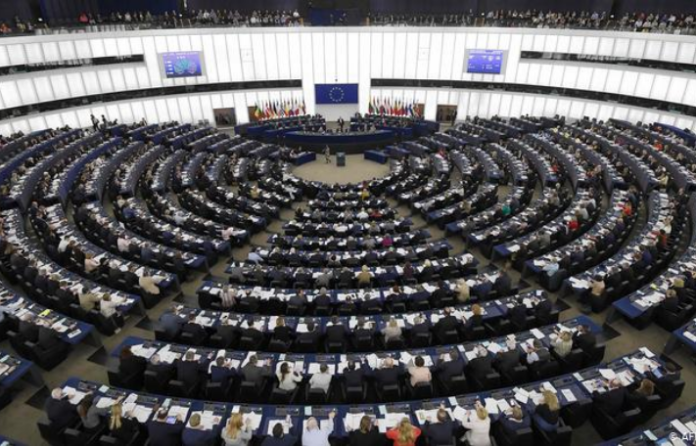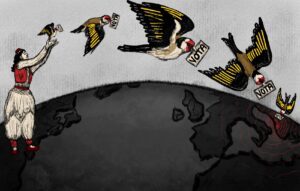The European Parliament has reiterated its call for visa liberalization for Kosovo and, on the other hand, for the normalization of relations between Kosovo and Serbia, in order for both countries to advance towards the European Union.
These calls are included in the texts of the draft reports on Kosovo and Serbia, which were provided by Radio Free Europe.
The report reiterates that Kosovo has met all the criteria for visa liberalization since 2018, but the decision on visa liberalization has not yet been approved.
Meanwhile, the EU Council is called to urgently take the decision on visa liberalization for the citizens of Kosovo.
The report states that they are aware of Kosovo’s intention to apply for EU membership.
Kosovo has made progress in the fight against organized crime and corruption, and the commitment to advance reforms within the European Reform Agenda is welcomed, the report said. Evidence of this is the fact that Kosovo has advanced by 17 positions in the corruption perception index of Transparency International.
Also mentioned is the fact that in Kosovo there is great support for EU integration during 2022.
“But we underline the fact that there is no quick procedure and that the normalization of relations with Serbia is necessary for the advancement of Kosovo on its European path,” reads the text of the draft report, which will be discussed on Thursday in the session of the Committee on Foreign Affairs of the European Parliament.
This time too, the call for the 5 EU countries to recognize Kosovo is repeated.
“We express regret for the fact that 5 EU member states have not yet recognized Kosovo and we reiterate the call to do so,” the text reads.
Through this report, the European Parliament expresses its full support for Kosovo’s warning to apply for membership in the Council of Europe.
At the same time, it joined all EU positions regarding Russia’s aggression against Ukraine, announced sanctions and condemned the aggression with a special Resolution in the Assembly.
In the text, criticisms are directed at Kosovo for the situation in the Judiciary. Concern has been expressed that the Judiciary continues to be inefficient and sensitive to political interference. In this regard, the proposal for the reform of the Prosecution was welcomed and it was requested to take into account the opinion of the Venice Commission.
Parliament is also aware of the Government’s plan for vetting of judges and prosecutors and underlines that this should remain only as a last resort and not ignore the positions of the EU and the United States of America.
The effort for depoliticization and professionalization of civil servants was also welcomed.
The Government of Kosovo has been requested to implement the decision of the Constitutional Court for the Monastery of Deçan. “We are concerned that the authorities have not yet implemented this decision and thus undermines the Government’s commitment to strengthening the rule of law and respect for the independence of the judiciary,” the text reads.
Parliament, according to the draft report, regrets the limited success of initiatives to include the Kosovo Serb community in political, social and economic structures. Meanwhile, he recalled that the institutionalization and learning of official languages in Kosovo and equal access to services and information in official languages is essential.
Recalling the role of the media as a pillar of democracy, an invitation is made to protect journalists from political pressure and it is said that offensive language towards journalists is unacceptable.
There is also a need for greater transparency of the media, including their ownership.
He also expressed regret for the decision of the Government of Kosovo not to allow Kosovo Serbs to vote in the elections in Serbia.
Meanwhile, the text of the draft report on Serbia expresses regret for the fact that this country has not supported EU sanctions against Russia. The same text calls on the authorities in Serbia to “demonstrate genuine commitment to EU values and to adapt to EU decisions and attitudes in foreign and security policy”.
The text states that the deputies are “deeply concerned” about the spread of misinformation about Russia’s aggression against Ukraine and called on the authorities in Serbia and the European Commission to support the infrastructure for the fight against misinformation and other hybrid threats.
European parliamentarians will also call on Serbia to take action against the glorification of war criminals and to stop inciting rhetoric that worsens relations with its neighbors and threatens regional stability and reconciliation.
Both in the text of the draft report on Kosovo and in this one on Serbia, it is recalled that progress on the road to the EU related to the progress in the process of normalization of relations with Kosovo.
Both sides are committed to reaching a comprehensive agreement on the normalization of relations that would be key to both sides’ progress on their European path.
The texts of these two drafts will be discussed on Thursday, and then the deputies will be able to propose amendments. Later in the form of the European Parliament Resolution they will have to be adopted in a plenary session. Such resolutions are of political importance because they represent the views of this important institution in the EU, but they have no binding force on member states.








